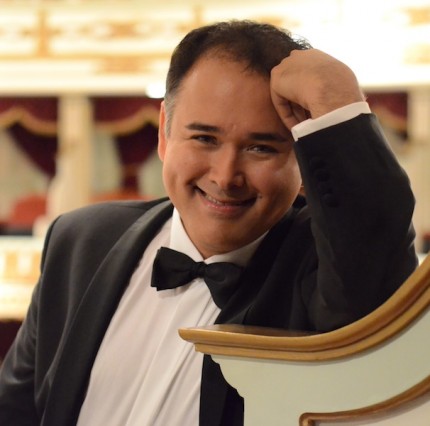Tenor Camarena ignites a fire in high-flying Chicago debut

“So, you like high notes, right?” asked a beaming Javier Camarena of his ecstatic audience Wednesday night.
For a relatively unknown singer to come close to packing the Harris Theater is quite an achievement. Yet Camarena did just that in his highly anticipated Chicago debut, which created one of the most electric vocal nights of the current season.
The Mexican tenor has been earning raves at the Metropolitan Opera and internationally in recent seasons. Two years ago in Rossini’s La Cenerentola he became only the third singer in the Met’s long history allowed to encore an aria. The others were Luciano Pavarotti and Juan Diego Florez—and based on his athletic vocalism Wednesday night, Camarena showed himself worthy to stand with those two celebrated colleagues.
Camarena’s local bow clearly created much anticipatory buzz, and the hall was packed with press, opera fans, proud supporters from Chicago’s Mexican community, and a sizable Lyric Opera contingent, including general director Anthony Freud.
Youthfully cherubic even with some silver in his hair, the 40-year-old singer indeed possesses an impressive instrument. Camarena’s tenor has striking flexibility and ease of production in the high tessitura, which has made him a go-to favorite for the bel canto roles of Rossini and Donizetti. What makes Camarena’s voice especially noteworthy is the power and technical sheen of his singing, which provided several thrilling high-flying moments.
If there was one quibble it was that the program didn’t allow enough opportunity for Camarena to explore greater artistic depths, with the weightier music confined entirely to the first half. Singing with reference to his scores on a stand throughout the evening, however, didn’t seem to impact his spontaneous style.
Camarena opened the evening with Beethoven’s Three Songs, Op. 83. Taken at a lugubriously slow tempo, “Wonne der Wehmuth” was skillfully sustained but unconvincing, with the singer’s German on the cloudy side. “Was zieht mir das Herz so?” showed Camarena to better advantage, displaying vibrant tone in this charming confession of love. His ardent rendering of “Kleine Blumen, kleine Blätter” was the best of the set, with fine ease and phrasing in the long, almost Schubertian melodic line.
If the interpretive side was a bit surfacey in the Beethoven, Camarena seemed at home in the more overtly Romantic settings of Liszt’s Tre sonetti di Petrarca. “Benedetto sia’l giorno,” served as a simpatico vehicle, showcasing his vocal agility, and the tenor threw off a ringing climactic high D in “Pace non trovo.” If there was a fleeting hint of tonal dryness on top, “I’vidi in terra angelici costumi” showed Camarena’s ability to caress a long line with fluidity and a loving legato.
His accompanist Angel Rodriguez showed himself a first-class artist in his own right all evening. The pianist offered close support and played with a terraced range of hues and dynamics, as with his pearly-toned postlude to the final Liszt song.
The second half of the program was devoted entirely to songs of Francesco Paolo Tosti, perhaps marking the centenary year of the Italian composer’s death.
The tenor was at his most idiomatic here, delivering open-hearted emotional engagement to Tosti’s ripely Italianate settings. Of Tosti’s Quattro canzoni d’Amaranta, Camarena brought finely shaded expression to “Lasciami! Lascia qui’iorespiri,” building inexorably to the song’s climax. “L’alba separa dalla luce l’ombra” stopped the set midway with his powerfully attacked top notes sending his many attendant admirers into a frenzy.
Four more settings by the Italian composer followed the set. Even for aficionados eight Tosti songs in a row is a bit too much of a good thing but his vociferous fans were clearly not complaining. “Sogno” was a highlight of the evening, rendered with rapt intimacy, and “Ideale” brought a wonderfully supple response and more clarion top notes.
The thunderous audience response brought the tenor back out for four encores. With several audience members shouting out requests, Camarena showing himself a bit of a showman, drawing out the cheers and basking in the unceasing applause and ovations each time.
The first encore was what many were waiting for: Tonio’s showpiece aria (“Ah, mes amis…pour mon âme”) from Donizetti’s La Fille du regiment. One can go a lifetime and never hear this challenging music sung with such technical gleam and security, Camarena nailing every one of the nine high C’s with astonishing power and panache.
With the Harris theater turned into a virtual love fest with the tenor, Camerena returned for three more encores: a vibrant “Granada” and two impassioned Mexican songs (“Júrame” and “Canción mixteca”), dedicated in his Spanish introductions to Chicago’s Mexican community.
Posted in Uncategorized


